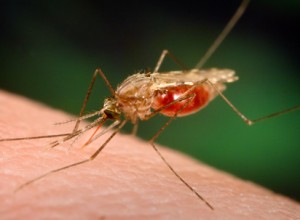Ghana is aiming at having no malaria deaths by 2025
 With Ghana still in the control stages of containing malaria, the country is hoping to record no deaths from the disease by 2025 even as it works towards the ultimate goal of eliminating malaria completely from the country.
With Ghana still in the control stages of containing malaria, the country is hoping to record no deaths from the disease by 2025 even as it works towards the ultimate goal of eliminating malaria completely from the country.
The Ghana Health Service (GHS) through its agency, the National Malaria Control Programme (NMCP), has over the years put in a lot of interventions to control the disease, yet the disease continues to kill people and is still among the top diseases reported at OPDs across health facilities in the country.
There has been significant increases in the number of suspected malaria cases being tested across health facilities but over 200 people died from malaria despite the over 90 per cent cases tested across health facilities in 2021.
These came to light during a day’s meeting to launch the “March to Kigali” campaign in Ghana. Globally, the campaign was launched in April 2021 as a buildup to the Summit on Neglected Tropical Diseases (NTD) and Malaria of the Commonwealth Heads of Government Meeting (CHOGM) in Kigali, Rwanda.
However, the Summit, which was postponed due to the COVID-19 pandemic, is scheduled for this year.
The African Media and Malaria Research Network (AMMREN), in partnership with the National Malaria Control Programme (NMCP) and the Neglected Tropical Diseases (NTDs) Programme of the GHS organized the launch of the Kigali campaign in Ghana, which seeks to promote an integrated approach to advocating for the elimination of neglected tropical diseases and malaria.
The launch is to create awareness and garner support to contain malaria and NTDs by getting all stakeholders across the country on board.
The meeting was attended by representatives from civil society organizations, journalists and officials from the NMCP and NTDs outfits.
Dr. Kofi Asemanyi-Mensah, Programme Manager of Neglected Tropical Diseases (NTDs) of the GHS, in a speech read on his behalf, said NTDs keep children out of school and parents from work.
While NTDs and malaria are entirely preventable and treatable diseases, they continue to be major obstacles to economic and social development in Africa, affecting the most marginalized populations.
Ghana is endemic for NTDs such as lymphatic filariasis, onchocerciasis, soil-transmitted helminthiasis, buruli ulcer and guinea worm.
Dr. Asemanyi-Mensah said case detection, mass drug administration in local communities and health communication are some of the main strategies adopted in controlling NTDs in Ghana.
He added that they are working towards making NTDs of no public health significance by 2030.
Dr. Charity Binka, Executive Secretary of AMMREN, speaking at the launch, said although COVID-19 caught the attention of the globe because of its devastating effects, yet malaria and NTDs continues to affect people.
She called for ownership and leadership at all levels to control the spread of these diseases and added that there is the need for accountability to track how funds are being used to control these diseases.
Dr. Binka urged everybody to get on board by ensuring that zero malaria starts with each person.
Various international declarations and roadmaps have demonstrated a revived political interest in tackling malaria and NTDs. Being led by a group of like-minded civil society organizations in Francophone and Anglophone African nations, the March to Kigali campaign was launched in April 2021 to gather global attention and accelerate action to end these preventable and treatable diseases.
The main objective is to advocate for increased government financial allocation to NTDs and malaria control from 2022 to 2023 and to advocate for increased private sector contribution to at least 10% of the national gap for NTDs and malaria financing from 2022 to 2023 and to work towards NTD and malaria control and elimination.
Among some of the specific objectives are to create a groundswell of support for increased action by the civil society organizations by ensuring continuing mobilization and effective utilization of resources generated for NTDs and malaria programmes in communities at all levels.
By Eunice Menka
Copyright ©2022 by NewsBridge Africa
All rights reserved. This article or any portion thereof may not be reproduced or used in any manner whatsoever without the express written permission of the publisher except for the use of brief quotations in reviews.
